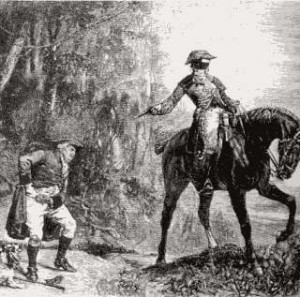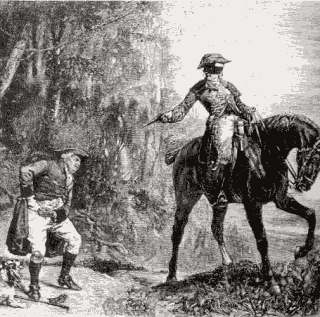Crime and Highway Robbery in Egham
 Charlotte Young, PhD candidate at Royal Holloway, University of London, investigates Egham during the Early Modern period and in this article, looks at crime and highway robbery.
Charlotte Young, PhD candidate at Royal Holloway, University of London, investigates Egham during the Early Modern period and in this article, looks at crime and highway robbery.
‘Two Men came riding towards us with their Faces muffled up in the Capes of their Great Coats, one of them … holding a Pistol … cry’d, Damn ye! dismount! … I endeavoured to draw my Pistol, but could not get it out of the Holster … The other Highway-man rode after me, Damn ye, says he, stop, or I’ll shoot. Do then, says I, shoot. Damn ye, says he, I’ll fire. Fire, says I, as soon as ye will … I want your Watch and Money; deliver this Minute, or I’ll fire … I have 12 Slugs in this Piece, and if you don’t deliver this Minute I’ll fire thro’ your Body.’
An account of a highway robbery which took place on Hounslow Heath on 30th January 1733.
The highway through Egham was a vital route linking London and Windsor with the west of England during the early modern period. Its importance can be seen in two pieces of Tudor legislation. On 18th February 1510 Henry VIII passed an act concerning the maintenance of Staines Bridge. The act described how ‘carts and horses laden with merchandize’ regularly travelled over the bridge into Egham, as well as ‘barges coming underneath’ travelling along the Thames. The act ordered between two and four tollkeepers to be stationed on the Staines side of the bridge to collect money from all travellers; the money would then be used for maintenance and repairs. Another act was passed by his daughter, Elizabeth I, in December 1597. The new legislation altered the location of the tollkeepers; two would be on the Staines side, and two on the Egham side. It also reiterated that the toll money they collected should be used for ‘the reparation and making of the said bridge and causeway’, and that the tollkeepers would be fined up to £10 if they were found to be negligent in their duties.
Travellers to and from London would inevitably be carrying money with them to pay for the charges and accommodation they encountered along the journey, which left them vulnerable to attacks from highway robbers. The Old Bailey defines highway robbery as ‘a robbery which took place on or near the King’s Highway’, which ‘frequently took place on the outskirts of London’ and were treated with such severity by the courts because they ‘interfered with the freedom to travel.’
Highway robbery was so common that numerous slang terms emerged referring to both the victims and perpetrators. A wonderful publication called A new dictionary of the canting crew in its several tribes of gypsies, beggers, thieves, cheats etc, written anonymously and published in 1699, lists several;
-
Bandit – defined as a highwayman on horse or foot
-
Rum-padders – defined as ‘the better sort of Highwaymen, well Mounted and Armed’
-
Snaffle – defined as ‘a Highwayman that has got Booty’
-
Provender – defined as ‘he from whom any Money is taken on the Highway’
Surviving court records show that several convictions for highway robberies in Egham took place across the early modern period, although it is likely that more were committed without the cases ever reaching court. Most trials took place at assize courts, which were local and held in the main county towns, but later cases took place in the Old Bailey, London’s central criminal court.
Two early cases of highway robbery in Egham can be seen in the Southwark assize records. On 31st January 1560 William Allen, a yeoman from London, was found guilty of assaulting John Appowell on the highway at Egham on 23rd July 1559. He stole £4 in money, and a gold signet ring. Allen was found guilty, but his sentence was not recorded. Three years later George Vale, a labourer from Southwark, was also convicted after assaulting and robbing John Hooker in the same place on 24th September 1562. His victim was clearly a wealthy man, because Vale relieved him of £26 13 shillings and 4 pence in money, as well as his brown horse, valued at £4. Vale was found guilty and sentenced to death by hanging.
On 3rd November 1573 another robbery took place on the highway at Egham, although the case was not brought to trial until 4th October 1575, at Kingston Assizes. Anthony Cooke, a bargeman from Weybridge, was accused of stealing 6 shillings from an unknown man. He had managed to escape arrest, and the case was presented in absentia. He was eventually put on trial for the crime in July 1576 and found not guilty. We may never know whether or not he did steal the money, but it seems likely that the long period of time between the crime taking place and the trial gave him a real advantage, as it would be hard to prove.
Another case where the defendants managed to escape prosecution took place at Reigate Assizes on 13th April 1596. Two tailors from London, Edward Whitney and John Wright, were accused of assaulting Ralph Doylie, described as a gentleman, and his servant Thomas Preston, on 1st March, and stealing £7 10 shillings from Doylie. It is not clear why they managed to clear themselves, but they were both found not guilty.
Highway robberies were still taking place a century later. On 7th July 1697 William Cokeley of Englefield was tried at the Old Bailey for robbing the Winchester Waggon when it was passing through Egham on Saturday 29th June. This waggon was run by Thomas Waldren, and set out for Winchester from the Rose Inn on Holborn Bridge every Monday and Thursday. Cokeley was accused of taking ‘six pound weight of Hair’ worth £20, ‘a Silver Tankard, a Watch, and forty Ounces of burnt Silver’, all the property of George West. Cokelely was caught in Englefield with the stolen items, and he ‘could not deny but that he had part of the Goods.’ The jury found him guilty, and his punishment was to have his hand branded and be conscripted into military service.
In late February James Mills, who was described in the London Journal as ‘a Victualler in good business at the Fountain in Stocks-Market’, and James Spay, ‘a Poulterer in Leadenhall-Market’ were accused of committing highway robbery. They ‘attacked a young Lady in her Coach near Egham’ and stole ‘her Watch, Rings, and Money.’ A more sensational account of the robbery was printed in Applebee’s Original Weekly Journal on 3rd March;
‘The Highway Borrowers have furnish’d us lately with some Remarkables in their way.
The first was on Thursday Sev’nnight last, when two Highwaymen attacked a Lady in her Chariot, on the Road from Egham to Bagshot, and having taken her Watch and Money, were so much in haste for the Earrings, that they either cut them out, or tore them out of her Ears, in a most barbarous manner: The Lady’s Servants, that is to say, the Coachman and Foot Boy, driving the Lady immediately to the next Village, threw off the Harness, and mounting the Coach-Horses, pursued the Rogues, and giving Notice at a Turnpike where they expected they might come, and describing them, they were apprehended.’
The author expressed astonishment that the robbers turned out to be respectable citizens of London. He noted that ‘At present, they have taken up their Abode in the Marshalsea’, and were set to be tried at Winchester Assizes, rather than a Surrey court, because the crime had technically been carried out in Hampshire.
A final case of robbery in Egham was heard at the Old Bailey on 8th June 1791. John Hurst was accused of stealing a linen shirt worth 2 shillings, a pair of worsted stockings worth 4 pence, and a linen handkerchief, also worth 4 pence, belonging to Bernard Clemens of Staines. In his testimony Clemens said he lived in Staines, and had lost the items at approximately 12.30 on 24th April. A man called Thomas Hall was called as a witness, and he revealed that he had travelled across the bridge from Egham to Staines where he met Hurst, and the two went to the Red Lion Inn to enjoy a pint of beer. Hurst offered to sell Hall the shirt, stockings and handkerchief for a shilling, but Hurst was suspicious and asked the innkeeper whether he knew of anyone who had lost those items. The innkeeper said he did, so Hall and two other men detained Hurst on suspicion of theft. In his defence Hurst claimed that he had simply found the items by the side of the road ‘where some waggons stood all night’. He was found guilty, fined 1 shilling and imprisoned for 6 months.
By the end of the 18th century highway robberies were rapidly fading. Previously styled the ‘Gentlemen of the road’, improvements in transport, policing and banking had deprived the robbers of their lucrative business, and barely any convictions took place during the 19th century. The range of punishments handed out to the individuals explored in this article – from hanging, to branding, to a fine and imprisonment – all reflect the changing fortunes of highway robbers. When they were a common and ever present danger, their punishment was severest. When the threat had almost faded away, the punishment was greatly reduced.
Bibliography
- Anon, An account of the days of the going out of all the carriers, waggoners and stage-coaches, that come to London, Westminster and Southwark, from all parts of England and Wales (1690)
- Applebee’s Original Weekly Journal (London, England) Saturday, March 3, 1722.
- J S Cockburn (editor), Calendar of Assize Records, Surrey Indictments, Elizabeth I (London: Her Majesty’s Stationery Office, 1980)
- B E, A new dictionary of the canting crew in its several tribes of gypsies, beggers, thieves, cheats, &c., with an addition of some proverbs, phrases, figurative speeches &c.: useful for all sorts of people (especially foreigners) to secure their money and preserve their lives; besides very diverting and entertaining being wholly new (London: 1699)
- Clive Emsley, Tim Hitchcock and Robert Shoemaker, “Crime and Justice – Crimes Tried at the Old Bailey”, Old Bailey Proceedings Online (www.oldbaileyonline.org, version 7.0, accessed 24 April 2016)
- Journal of the House of Lords: Volume 1, 1509-1577 (London, 1767-1830), British History Online (http://www.british-history.ac.uk/lords-jrnl/vol1, accessed 24 April 2016)
- Thomas de Laune, The present state of London: or, Memorials comprehending a full and succinct account of the ancient and modern state thereof (1681)
- London Journal (London, England) Saturday, March 3, 1722; Issue CXXXVI.
- Danby Pickering, The Statutes at Large, from the Ninth to the 15th Year of King George II (London: 1765)
- Trial records from Old Bailey Proceedings Online (www.oldbaileyonline.org, version 7.2, accessed 24 April 2016)

